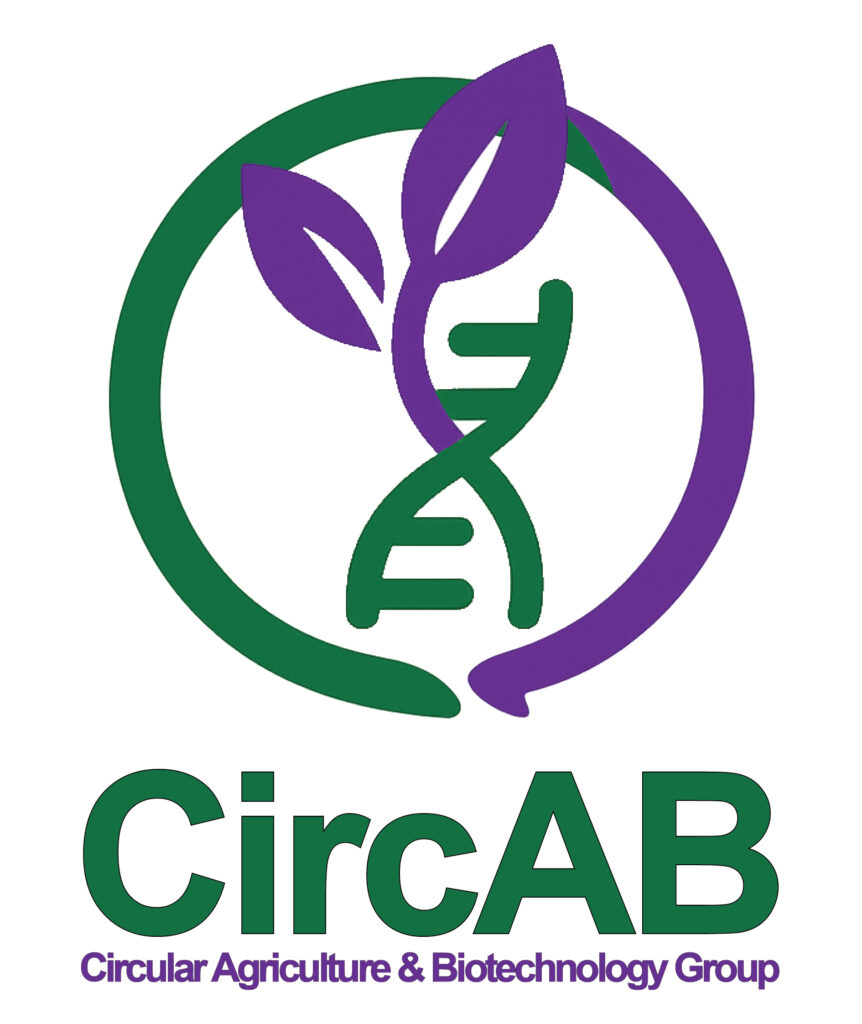The group brings together experts and principal investigators in the areas of biotechnology, environmental science, chemistry, microbiology, molecular biology plant science, soil health, green energy, water treatment, material science and predictive modelling, working towards transformation of bio-based industries directing them on a path of circularity and sustainability and creation of circular solution employing all available expertise.
CircAB concentrates on circularity across all industries, agroecology, sustainable production, zero-waste and zero-effluent processes, and non-fossil energy production.
Biotechnology: We work together to develop sustainable bio-based solutions, from initial discovery to pilot-scale implementation which are already an integral part of our ongoing projects such as BoiScaleUp, CircleBioP and CirCoVal.
Agriculture: Circularity is central to our group’s mission and its principals are applied to our work in agriculture through creation of Soil Health Living Lab SOILCRATES-Ireland, funded by European Commission through the Mission Soil project SOILCRATES and further EIP-Agri project SCEENE and ICT Agri project CAgriLab.
All research is designed with the zero-waste and no harm to environment principles, aiming to transform industries and society towards a nature-conscious solutions.

CircAB leverages expertise in biosciences, material sciences, chemistry, ICT and analytical techniques to achieve our vision.
Aims and Objectives
CircAB members will work together to develop sustainable bio-based solutions, from initial discovery to pilot-scale implementation, which is already an integral part of our ongoing projects such as CircleBioP and CirCoVal.
Circularity is central to our centre’s mission. Every project will be designed with the principles of zero waste and no harm, aiming to transform industries and society towards a nature-conscious lifestyle..
The group will concentrate on circularity across all industries, agroecology, sustainable production, zero-waste and zero-effluent processes, and non-fossil energy production.We will leverage our expertise in biosciences, material sciences, chemistry, and analytical techniques to achieve our vision.
Examples of Current Ongoing Projects:
CIRCOVAL
CirCoVal is a strategic project funded by the Department of Agriculture Food and the Marine that will deliver the best sustainability practices to Irish primary producers. To enable the bioeconomy and specifically meat industry to thrive in Ireland contributing impactfully to our ‘Climate Action Plan’ in reducing our overall carbon outputs and in particular contributing positively to SDG’s 7,9, 11, 12 & 13 we must empower Meat and Agri-Food sectors and its biomass producers with access to demonstration scale biotransformation research outputs. This evidence-based project will demonstrate nationally and internationally the capacity in Ireland to Transform, scale and progress meat processing and associated technologies from lower TRL to higher TRL. According to Circular Bioeconomy 2020 Summary Report “the major gaps and barriers for the development of the bioeconomy in Ireland included:
1) Incoherent framework for synergy building towards circular bioeconomy objectives,
2) Low competitiveness of bio—based products
3) Weak primary producer value chain,
4) Low commercialisation and market stimulation potential,
5)Less start-up capital and expansion funding opportunities in comparison to other developed economies,
6) Inflexible waste classification systems and handling procedures.”.
All of the existing barriers will be addressed through this project and allow to the Irish primary producers and processing industries such as meat Industry to transition through circularity and sustainability models. The creation of a circular bio-economy model for meat technology with positive economic, environmental, and social impacts will be required to enable the industry to
address sustainability challenges. This project is led by Technological University of The Shannon: Midlands Midwest with participation from the following partners: Teagasc Ashtown, University College Dublin, University College Cork, Dawn Meats, Kepak, Ashbourne Meats Processing, Irish Bioeconomy Foundation, Arigna Fuels, Loop Head Together, Liffey Meats, MyGug and BioConnect Innovation Centre.
Circular Biobased Pilot Scale Demonstration (CircleBio-P)
Scale up and demonstration activities are seen by the European commission as critical to the advancement of biobased products in society. The CircleBio-P project which is funded by the Department of Agriculture Food and the Marine aims to demonstrate an integrated one-stop-shop- bioeconomy innovation blueprint pilot at the National Bioeconomy Campus at Lisheen, Co. Tipperary using two exemplar projects. It will bring together relevant stakeholders to a scaled demonstration facility access point, providing state of the art high-quality biotransformation services aiming to unlock the innovation potential and discover opportunities to build relationships and partnerships across the circular bioeconomy. CircleBio-P will demonstrate two laboratory scale biobased processes, upscaled to demonstrate pilot level at the National Bioeconomy Campus and develop best-practice processes at scale to harness the full wealth of these two bioresource exemplars including process circularity and life cycle assessment evaluation. The demonstration upscaling projects will allow us to showcase how Ireland is responding to the national need for scaling biobased processes and stimulate others to undertake the work. CircleBio-P is TRL 4-7 as it will bridge the gap between fundamental and early stage applied biotransformation research (from Research Centres e.g., BIORBIC & Shannon Applied Biotechnology Centre and lab-based ideas from entrepreneurs/companies) and demonstration/market implementation leading to full demonstration of industrial implementation projects. This project is led by Technological University of The Shannon: Midlands Midwest, with the following partners participating University College Dublin, Trinity College Dublin, Irish Bioeconomy Foundation, Dawn Meats, Arigna Fuels, Green Generation Ireland and TIRLÁN.
The SOILCRATES project is an initiative funded by the Horizon Research and Innovation program to support the EU Mission “A Soil Deal for Europe”1. The project focuses on developing innovative solutions to enhance soil quality and promote sustainable soil management practices12.
SOILCRATES
Living Labs (LLs): SOILCRATES establishes four regional and interconnected Living Labs where various stakeholders, including land managers, scientists, citizens, businesses, and local authorities, collaborate to improve and monitor soil health and biodiversity.
Soil Literacy: The project aims to improve soil literacy by creating sustainable and dynamic Living Labs that monitor soil health and biodiversity beyond the current state-of-the-art.
Innovative Practices: By combining traditional and scientific knowledge with advanced technologies, SOILCRATES develops innovative soil improvement strategies tailored to each region’s specific conditions.
Collaboration and Co-Creation: The project emphasizes a user-centred approach, encouraging stakeholders to actively participate in co-creating and implementing solutions, fostering a sense of ownership and commitment to sustainable soil management practices. The Ireland South-West Living Lab is a key component of the initiative, focusing on sustainable soil management, biodiversity conservation, carbon sequestration, and circular agriculture. This Living Lab operates in the counties of Clare, Limerick, and Tipperary.
Some of the main activities in the Ireland South-West Living Lab include:
- Reducing nitrogen fertilizer impact: Addressing soil acidification and nutrient runoff by promoting practices like liming, protected urea, biochar application, and intercropping with nitrogen-fixing plants.
- Improving drainage in heavy soils: Implementing customized drainage systems and soil improvement techniques such as cover cropping and topsoil biochar applications to enhance soil quality and prevent waterlogging.
- Biodiversity conservation and carbon sequestration: Integrating biodiversity-friendly practices like wildlife corridors, cover cropping, and low-impact grazing to restore ecological balance and enhance carbon storage in soils.
- Artificial Intelligence for Living labs:
As a part of this project TUS researchers lead AI-assisted data management for Living lab, establishing and improving predictive modelling system that will assist to the Scientists and Farmers in assessing of soil health, biodiversity data and decision making for the soil health improvement techniques.
The Technological University of the Shannon (TUS) is one of the key partners in this Living Lab, collaborating with local farmers, government bodies, advisory services, and social organisations to co-create sustainable solutions.
Principal Investigators:
Lena Madden
Catherine Collins
Patrick Murray
Sushanta Saha
Yuansong Qiao
Yin Zhu
Postdoctoral Researchers:
Farruckh Raza
Mariagrazia Proto
Katie Shiels
Laura Rodrigues
Xinyu Yan
PhD Students:
Margarida Matias
Ahmed Abdellatif
Hina Imtiaz
Academics/Academic PIs:
Tanya Beletskaya
Josephine Tracey
Michela Ottavian







